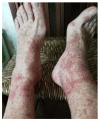Direct-Acting Antiviral Agents for HCV-Associated Glomerular Disease and the Current Evidence
- PMID: 31590268
- PMCID: PMC6963560
- DOI: 10.3390/pathogens8040176
Direct-Acting Antiviral Agents for HCV-Associated Glomerular Disease and the Current Evidence
Abstract
Glomerular disease is an extra-hepatic manifestation of hepatitis C virus infection (HCV) and membranoproliferative glomerulonephritis is the most frequent glomerular disease associated with HCV. It occurs commonly in patients with HCV-related mixed cryoglobulinemia syndrome. Patients with HCV-related glomerular disease have been historically a difficult-to-treat group. The therapeutic armamentarium for HCV-related glomerular disease now includes antiviral regimens, selective or non-specific immunosuppressive drugs, immunomodulators, and symptomatic agents. The treatment of HCV-associated glomerular disease is dependent on the clinical presentation of the patient. The recent introduction of all-oral, interferon (IFN)-free/ribavirin (RBV)-free regimens is dramatically changing the course of HCV in the general population, and some regimens have been approved for HCV even in patients with advanced chronic kidney disease. According to a systematic review of the medical literature, the evidence concerning the efficacy/safety of direct-acting antiviral agents (DAAs) of HCV-induced glomerular disease is limited. The frequency of sustained virological response was 92.5% (62/67). Full or partial clinical remission was demonstrated in many patients (n = 46, 68.5%) after DAAs. There were no reports of deterioration of kidney function in patients on DAAs. Many patients (n = 29, 43%) underwent immunosuppression while on DAAs. A few cases of new onset or relapsing glomerular disease in patients with HCV successfully treated with DAAs have been observed. In summary, DAA-based combinations are making easier the management of HCV. However, patients with HCV-induced glomerular disease are still a difficult-to-treat group even at the time of DAAs.
Keywords: direct-acting antiviral agents; glomerulonephritis; hepatitis C virus; mixed cryoglobulinemia; proteinuria; sustained virological response.
Conflict of interest statement
The authors declare no conflict of interest.



